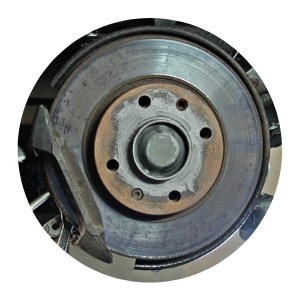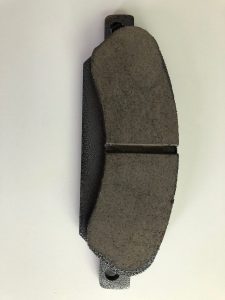If you find that your vehicle’s steering wheel is shaking or vibrating when you press the brake pedal, it is a serious problem. It is almost always the brake rotors that are the cause of the problem, but there can be other causes as well, we’ll cover those below.
There are plenty of other issues that can cause the steering wheel to wobble. But, if your car or truck is only shaking when braking, that’s a pretty good indication that it’s a brake related problem, and it’s usually the rotors causing the issue.
Shaking When Braking: Causes
A shaking steering wheel can be caused by many things, such as bad wheels, a bad alignment, suspension damage, and damaged tires just to name a few.
With that being said, it’s important to make absolutely sure that you are only feeling the steering wheel shake when you brake. If it’s shaking all the time, but just worse when you brake, it could be any of these things, and a real safety concern.
If you’ve recently had your wheel(s) taken off for any reason (think safety inspection, tire replacement, brake job, etc) make sure that the lug nuts are tightened.
Loose wheels will react to brake pressure and vibrate the steering wheel under braking. This is mentioned because if the lug nuts aren’t tight, a wheel can and will fall off. It’s also quick and easy to check.
Here are some of the most common reasons that you feel shaking when braking:
1. Guide Pin Failure
Your brakes calipers have something called guide pins. These pins let the caliper move freely, and make sure the brake pad is making even contact with the rotors.
These pins are often overlooked when maintaining a vehicle. They are often covered with a small protective boot. If that boot fails, they can dry up and will stop moving freely.
When guide pins fail, they cause the brake pads to make uneven contact with the rotors. They can also make the caliper stick, which can burn up the brakes fast. This will cause your car or truck to have squeaky brakes.
The extreme heat will also cause the pads to “glaze”. This hardening of the brakes will increase the distance needed to stop the vehicle. Glazed pads need to be replaced.
Between the potential for the brake pads to hit the rotor at the wrong angle, glazing, and potential stuck calipers, dry guide pins can definitely cause your steering wheel to vibrate when you push the brakes.
2. Rotors

The number one reason that your vehicle’s steering wheel will shake is warped brake rotors. Rotors can warp if they’ve been worn too low, or worn unevenly.
Warped rotors are even more common today than they used to be. This is because auto manufacturers are constantly trying to reduce unsprung weight, which means thinner rotors.
If the surface of the rotor is not smooth, you’ll need to either have them resurfaced, or buy new ones. A visual inspection will often reveal grooves and unevenness even to the untrained eye.
3. Brake Pads
When the brake pads are operating normally, a pad that is not worn out or dirty is making even contact with the rotor. It distributes the pressure evenly and your car or truck’s steering wheel will not shake.
If the brake pads are worn past their useful life, or if they are dirty, they will no longer be able to make the quality contact with your steering wheel. At this point, you’ll feel your steering wheel shake as the brakes are pressed down.
Conclusion: Car Shaking When Braking
It is advisable to have your brakes repaired as soon as possible. Warped rotors, dry guide pins, and bad brake pads can all increase your vehicle’s stopping distance.
This is dangerous in itself. Good luck diagnosing your shaking steering wheel when braking. Please leave a comment below if there is anything that you would like to add.

